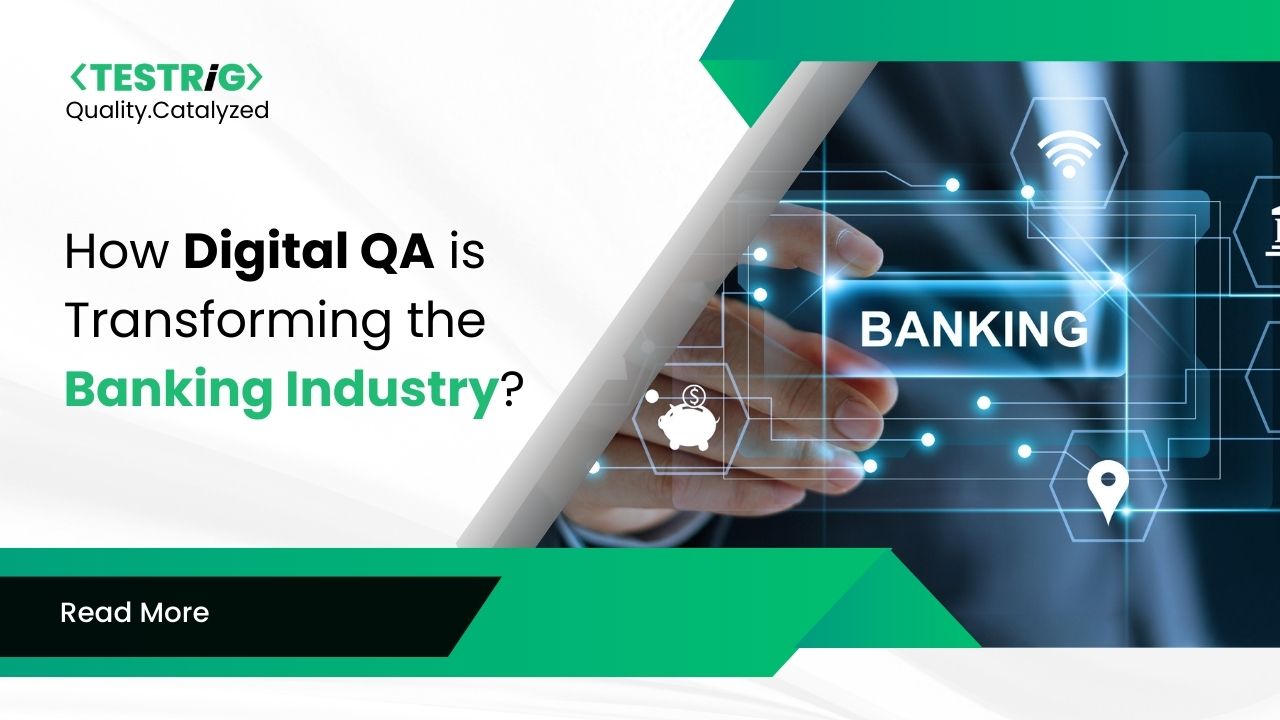The Role of Digital Quality Assurance in Transforming Banking
 Vijayashree Shinde
Vijayashree Shinde
As banking rapidly embraces digital transformation, the industry is shifting from legacy systems to agile, technology-driven operations. With the digital transformation market expected to grow at a 27.6% CAGR from 2024 to 2030, the urgency for innovation in banking is clear. Today, 85% of bank customers rely on digital channels, expecting fast, secure services like instant payments, remote deposits, and seamless integrations with apps.
To meet these expectations, banks must prioritize digital quality assurance (QA) to ensure systems are secure, reliable, and scalable. Without robust QA, banks face risks like service disruptions and data breaches, which can erode customer trust.
we will delve into how digital quality assurance (QA) plays a crucial role in the banking sector’s transformation, ensuring secure, efficient, and customer-centered digital experiences.
The Role of Digital Quality Assurance in Transforming Banking
Digital transformation in banking is more than implementing new technologies; it’s about creating ongoing value, improving resilience, and providing a seamless user experience. Here’s why digital QA is vital for this journey:
- Reliability and Performance Under Pressure
Banks handle immense transaction volumes around the clock, and any disruption could lead to serious repercussions. Robust QA strategies ensure that banking servers and applications perform optimally, even under high-load conditions. Proper load testing can prevent service outages, maintain customer trust, and keep the system functioning smoothly.
2. Integration with Third-Party Applications
From eCommerce to travel, banking apps are now deeply integrated with various third-party services. A comprehensive digital QA framework supports these integrations by stabilizing payment gateway functions and ensuring a consistent user experience across platforms.
3. Cybersecurity and Data Protection
Security is paramount in banking, where data breaches can lead to devastating consequences. Digital QA involves rigorous vulnerability checks across all systems, helping to identify and address security gaps that could expose banks and customers to cyber threats.
Benefits of Successful Digital Transformation in Banking
Achieving a successful digital transformation, backed by robust QA processes, brings a host of advantages:
- Enhanced Operational Efficiency
By adopting digital tools, banks simplify and accelerate core processes, such as:
a. Depositing funds and transferring money through mobile apps.
b. Using electronic signatures to reduce paperwork.
c. Processing loan approvals instantly, often without branch visits.
d. Automating bill payments to prevent missed deadlines.
2. Data-Driven Decision Making
With more data at their fingertips, bank management can make informed choices that reflect real-time customer needs. Digital transformation empowers financial institutions to make quick, well-informed decisions, using analytics to tailor services and improve customer engagement.
3. Streamlined Infrastructure and Data Management
Moving away from disconnected legacy systems, banks can shift to a more centralized and streamlined digital infrastructure. This brings multiple benefits:
a. Reduced infrastructure complexity and maintenance costs.
b. Consistency in data quality and accuracy.
c. Faster, more efficient data processing, eliminating redundant tasks and improving data reliability.
4. Improved Reporting Capabilities
Real-time data access enables banks to create accurate, timely reports with minimal IT involvement, freeing up teams to focus on higher-level analysis. This allows senior management to identify trends early, respond proactively, and keep operations aligned with evolving customer expectations.
Strategies to Accelerate Digital Transformation in Banking
A strong digital QA framework supports these transformations and provides a roadmap for banks to harness data and technology optimally.
- Utilizing Customer Data Effectively
Banks collect valuable data that, when analyzed, reveal insights into customer behavior and preferences. This enables institutions to offer personalized services, strengthening customer relationships and enhancing risk management by detecting transactional patterns that signal potential fraud.
2. Prioritizing Data Quality
High-quality data ensures reliable insights, improved risk management, and customer satisfaction. A commitment to data quality minimizes the risk of errors that could harm customer trust or lead to compliance issues, and it sets the foundation for reliable analytics and decision-making.
3. Building Skilled IT Teams
The digital transformation journey requires an adept IT team capable of managing security, scalability, and rapid adaptation to new technologies. The rise of no-code and low-code platforms allows even non-technical staff to contribute to development and testing, accelerating innovation and enabling the IT team to focus on strategic initiatives.
Conclusion:
As we move into 2024, banks must navigate a complex landscape marked by economic volatility and shifting consumer demands. While the rapid pace of digital advancement introduces challenges in data management and cybersecurity, it also presents significant opportunities for leveraging automation and data-driven insights.
To thrive, banks must integrate digital quality assurance into their core processes. By prioritizing proactive development over maintenance, CIOs can deploy innovative systems that boost customer engagement and operational efficiency. A strong focus on quality assurance will enable banks to deliver secure, seamless experiences that meet evolving customer needs in an increasingly digital world.
At Testrig Technologies, we specialize in providing comprehensive QA software testing services tailored to the unique needs of the banking sector. Partner with us to streamline your testing process and ensure flawless software delivery. Contact us today!
Subscribe to my newsletter
Read articles from Vijayashree Shinde directly inside your inbox. Subscribe to the newsletter, and don't miss out.
Written by
